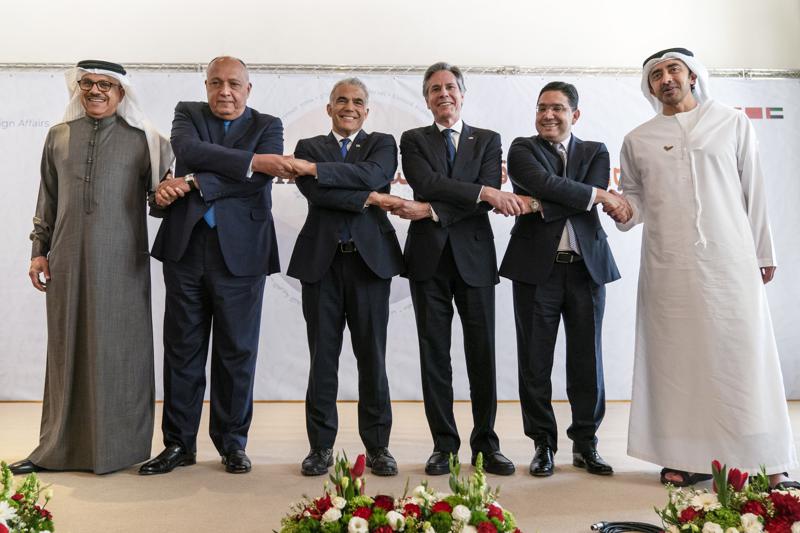Israel on Monday hosted the foreign ministers of four Arab nations and the United States in a bid to strengthen its position in a rapidly shifting Middle East.
The gathering brought together the top diplomats from all but one of the Arab countries that have normalized relations with Israel in U.S.-mediated negotiations.
That included three that signed the so-called Abraham Accords during the Trump administration in 2020 — the United Arab Emirates, Bahrain and Morocco — as well as Egypt, the first country to make peace with Israel.
Meeting at a resort in Israel’s southern Negev Desert, the ministers and Secretary of State Antony Blinken pledged to expand cooperation to include energy, environmental and security matters and try to bring others into the agreements.
“Just a few years ago this gathering would have been impossible to imagine,” Blinken said. “The United States has and will continue to strongly support a process that is transforming the region and beyond.”
Beyond the smiles and handshakes, a series of regional threats loomed over the gathering.
As the ministers gathered late Sunday, a deadly shooting rampage claimed by the extremist group Islamic State killed two young police officers in central Israel. Participants also repeatedly expressed misgivings over Iranian military behavior across the region and the possible renewal of the international nuclear accord with Iran.
Meanwhile, Jordan’s king, whose government declined to participate in the foreign ministers’ meeting, instead visited the Israeli-occupied West Bank in solidarity with the Palestinians. King Abdullah II’s high-profile visit, and Jordan’s absence from the ministers’ meeting, were reminders that the Palestinian issue has not disappeared from the regional agenda.
Israeli Foreign Minister Yair Lapid said the group was “making history” as he announced the gathering would become an annual event. He said the countries were forming a partnership based on technology, religious tolerance, security and intelligence cooperation.
“This new architecture, the shared capabilities we are building, intimidates and deters our common enemies, first and foremost Iran and its proxies,” he said. “They certainly have something to fear. What will stop them is not hesitation or being conciliatory but rather determination and strength.”
The Arab ministers condemned Sunday night’s deadly shooting in the city of Hadera.
The gathering comes as the Biden administration has been working to renew the 2015 international nuclear deal with Iran. The agreement placed curbs on Iran’s nuclear program in exchange for billions of dollars in relief in sanctions relief.
With support from Israel, the Trump administration withdrew from the deal in 2018, causing it to unravel.
Although Iran has since raced ahead with its nuclear program, Israel and Gulf Arab countries are deeply concerned about restoring the original deal. Israel fears it does not include enough safeguards to prevent Iran from developing nuclear weapons. Both Israel and its Gulf allies also believe that relief from economic sanctions will allow Iran to step up its military activities across the region, including support for hostile militant groups.
Bahrain’s foreign minister, Abdullatif al-Zayani, said the need to cooperate was made “more urgent” by attacks by Iranian-backed militant groups and the unresolved nuclear issue.
“We need to put into practice the principles behind the accords, mainly those of dialogue, cooperation and mutual respect,” he said. “By doing so, we will demonstrate to the whole region what can be achieved by working together.”
Blinken sought to address the concerns about Iran on Sunday, saying that the U.S. sees “eye to eye” with Israel on the goal of making sure Iran never builds a nuclear weapon.
“We are both committed, both determined that Iran will never acquire a nuclear weapon,” he said.
Underscoring regional anxieties, Israel’s government hastily arranged the meeting of top diplomats from Arab countries that have normalized relations with Israel. The two-day gathering, with Blinken, took place at the kibbutz in the Negev Desert where Israel’s founding father, David Ben-Gurion, retired and is buried.
Lapid on Monday visited Ben-Gurion’s grave with Blinken. But the Arab ministers did not join them, citing scheduling issues. Such a visit would have been a remarkable step given the sensitivities with the Palestinians over Israel’s establishment. Palestinians blame Ben-Gurion for their “naqba,” or catastrophe, the term they use for the mass displacement of hundreds of thousands of Palestinians during the war surrounding Israel’s establishment in 1948.
(AP)












One Response
OH WOW
Great photo op.
I get the chills.
Did they really condemned repeated murder of Jews by ISIS?
ITS really revolting that israeli government gloats over this while ISIS is roaming around and murdering Jews in Israel with Israeli Amunitions and “they say they have no clue” ISIS is live and well in Israel.
WHY DONT BIDEN GIVE THE ABBAS AND PA 1,000,000,000 THATS BILLION DOLLARS IN AID NOW.
PLEASE
WE WILL JUST PRINT MO MONEY.